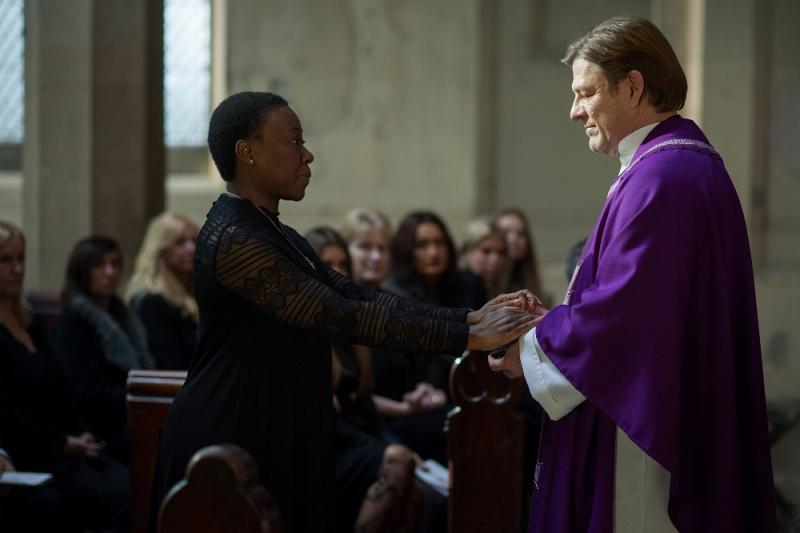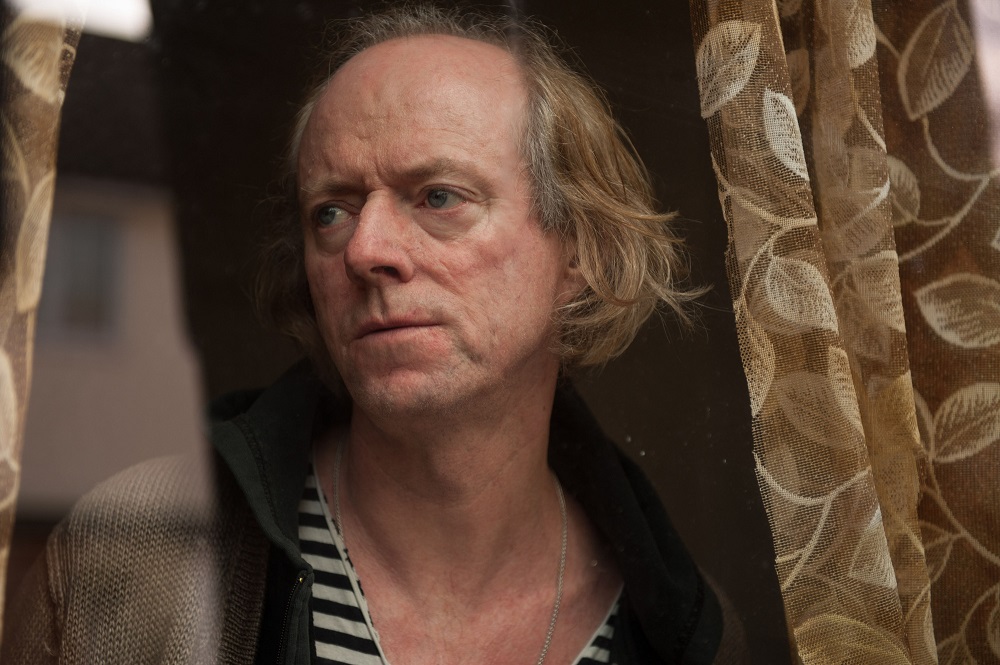Broken, BBC One series finale review - Seán Bean's quiet immensity | reviews, news & interviews
Broken, BBC One series finale review - Seán Bean's quiet immensity
Broken, BBC One series finale review - Seán Bean's quiet immensity
Jimmy McGovern's portrait of the Catholic church in crisis ends in moving redemption

The Catholic Church hasn’t enjoyed a good press on screen lately. Nuns punished Irishwomen for their pregnancies in Philomena. Priests interfered with altar boys in Spotlight. And in The Young Pope a Vatican fixated on conservatism and casuistry elects a pontiff who sees himself as a rock star.
Over six parts on BBC One, Broken has felt like walking along half a dozen stations of the cross. McGovern’s portrait of a broken priest – and by extension, a broken priesthood – was exceptionally short on levity or solace. The doubts of Father Michael Kerrigan pursued him to the brink of despair, as he perceived in himself only failure and fraudulence. And the redemption when it came felt like a message from McGovern to the Roman Catholic church. Not quite keep calm and bugger on (because that has been part of the problem), but keep the faith, keep up the good work.
At times the drama looked like a greatest hits of McGovern’s obsessions and preoccupations. Gerard Manley Hopkins’s poem “The Wind Hover” first came up in The Lakes, the priest who is fearful of his own homosexuality in Priest. A character who couldn’t live with himself leapt off a high-rise building in Cracker. And from Cracker onwards, a constant thread of McGovern’s writing has been the moral dilemma of the priest, as a receptacle of terrible truths, who cannot break the seal of confession. Adrian Dunbar, who played one such priest in the very first episode of Cracker, completed the circle as a sort of benign father confessor to Father Michael Kerrigan in Broken. But it has all been very different too. Unlike the self-contained stories in McGovern's dramas The Street or Accused, the blighted lives of Broken’s parishioners spilled across one another. Only the fifth episode embarked on a plotline and concluded it, and it felt like one McGovern has been itching to tackle for years: the dialectical struggle between the letter and spirit of the Bible on the matter of homosexuality (eliciting a firecracker of a performance from Ned Dennehy as grieving, dope-smoking lapsed Catholic homosexual).
But it has all been very different too. Unlike the self-contained stories in McGovern's dramas The Street or Accused, the blighted lives of Broken’s parishioners spilled across one another. Only the fifth episode embarked on a plotline and concluded it, and it felt like one McGovern has been itching to tackle for years: the dialectical struggle between the letter and spirit of the Bible on the matter of homosexuality (eliciting a firecracker of a performance from Ned Dennehy as grieving, dope-smoking lapsed Catholic homosexual).
Elsewhere, a woman kept her mother’s death secret so she could claim her pension. A mentally ill boy was unlawfully killed by the police. A woman addicted to gambling abandoned her three children by committing suicide rather than face the shame of prison for theft. Her daughter took vengeance on the slot machines with a sledgehammer, allowing Phil Davis to march in and deliver two wonderfully contrasting cameos.
Sometimes it has felt as if McGovern and his co-writers (Shaun Duggan, Colette Kane, Nick Leather) were wielding a similar implement. But mostly the writing has been feather-light, and it has met with a performance of quiet immensity from Seán Bean as Father Michael, the priest who is never off duty (and the one moment he is, when he fails to answer the call of a parishioner, his conscience punishes him to the limits). Bean has made a career out of playing thugs and swashbucklers, so this staggering turn as a softly spoken hulk anguished by cruel memories from his youth came up on the blind side. His voice barely ever troubled the decibel counter until the final episode when he rose to righteous fervour in his sermon about the moneylenders in the temple. Of the many excellent performances, Muna Otaru as Helen Oyenusi and Paula Malcomson as Roz Demichelis (pictured below with Bean) stood out as a sort of suffering Madonna and self-punishing Mary Magdalene. The dramatic structure was never more jaggedly imperfect than in the final episode, which was built around a tense inquest, a riotous wake, and a redemptive funeral. There was nothing so clean as closure in those flashbacks to Kerrigan’s haunting childhood, so reminiscent of Dennis Potter. A deathbed apology from his mother (Aine Ni Mhuiri) was all he got, and it had to be enough. And yet imperfection – the absence of conclusions – felt right.
The dramatic structure was never more jaggedly imperfect than in the final episode, which was built around a tense inquest, a riotous wake, and a redemptive funeral. There was nothing so clean as closure in those flashbacks to Kerrigan’s haunting childhood, so reminiscent of Dennis Potter. A deathbed apology from his mother (Aine Ni Mhuiri) was all he got, and it had to be enough. And yet imperfection – the absence of conclusions – felt right.
Probably only McGovern could have got this series commissioned: six primetime hours devoted to matters of faith and conscience in a nominally Anglican culture. At least from Catholicism you get blood, guts and thunder, not the vanilla agonies and pastel ecstasies of the Church of England. The final absolution for Father Michael, in which his parishioners queued up at communion to thank and praise him, was also vintage McGovern: somewhere between unforgiveable and unarguable. Who else confesses that they were deeply moved?
Add comment
The future of Arts Journalism
You can stop theartsdesk.com closing!
We urgently need financing to survive. Our fundraising drive has thus far raised £49,000 but we need to reach £100,000 or we will be forced to close. Please contribute here: https://gofund.me/c3f6033d
And if you can forward this information to anyone who might assist, we’d be grateful.

Subscribe to theartsdesk.com
Thank you for continuing to read our work on theartsdesk.com. For unlimited access to every article in its entirety, including our archive of more than 15,000 pieces, we're asking for £5 per month or £40 per year. We feel it's a very good deal, and hope you do too.
To take a subscription now simply click here.
And if you're looking for that extra gift for a friend or family member, why not treat them to a theartsdesk.com gift subscription?
more TV
 Hostage, Netflix review - entente not-too-cordiale
Suranne Jones and Julie Delpy cross swords in confused political drama
Hostage, Netflix review - entente not-too-cordiale
Suranne Jones and Julie Delpy cross swords in confused political drama
 In Flight, Channel 4 review - drugs, thugs and Bulgarian gangsters
Katherine Kelly's flight attendant is battling a sea of troubles
In Flight, Channel 4 review - drugs, thugs and Bulgarian gangsters
Katherine Kelly's flight attendant is battling a sea of troubles
 Alien: Earth, Disney+ review - was this interstellar journey really necessary?
Noah Hawley's lavish sci-fi series brings Ridley Scott's monster back home
Alien: Earth, Disney+ review - was this interstellar journey really necessary?
Noah Hawley's lavish sci-fi series brings Ridley Scott's monster back home
 The Count of Monte Cristo, U&Drama review - silly telly for the silly season
Umpteenth incarnation of the Alexandre Dumas novel is no better than it should be
The Count of Monte Cristo, U&Drama review - silly telly for the silly season
Umpteenth incarnation of the Alexandre Dumas novel is no better than it should be
 The Narrow Road to the Deep North, BBC One review - love, death and hell on the Burma railway
Richard Flanagan's prize-winning novel becomes a gruelling TV series
The Narrow Road to the Deep North, BBC One review - love, death and hell on the Burma railway
Richard Flanagan's prize-winning novel becomes a gruelling TV series
 The Waterfront, Netflix review - fish, drugs and rock'n'roll
Kevin Williamson's Carolinas crime saga makes addictive viewing
The Waterfront, Netflix review - fish, drugs and rock'n'roll
Kevin Williamson's Carolinas crime saga makes addictive viewing
 theartsdesk Q&A: writer and actor Mark Gatiss on 'Bookish'
The multi-talented performer ponders storytelling, crime and retiring to run a bookshop
theartsdesk Q&A: writer and actor Mark Gatiss on 'Bookish'
The multi-talented performer ponders storytelling, crime and retiring to run a bookshop
 Ballard, Prime Video review - there's something rotten in the LAPD
Persuasive dramatisation of Michael Connelly's female detective
Ballard, Prime Video review - there's something rotten in the LAPD
Persuasive dramatisation of Michael Connelly's female detective
 Bookish, U&Alibi review - sleuthing and skulduggery in a bomb-battered London
Mark Gatiss's crime drama mixes period atmosphere with crafty clues
Bookish, U&Alibi review - sleuthing and skulduggery in a bomb-battered London
Mark Gatiss's crime drama mixes period atmosphere with crafty clues
 Too Much, Netflix - a romcom that's oversexed, and over here
Lena Dunham's new series presents an England it's often hard to recognise
Too Much, Netflix - a romcom that's oversexed, and over here
Lena Dunham's new series presents an England it's often hard to recognise
 Insomnia, Channel 5 review - a chronicle of deaths foretold
Sarah Pinborough's psychological thriller is cluttered but compelling
Insomnia, Channel 5 review - a chronicle of deaths foretold
Sarah Pinborough's psychological thriller is cluttered but compelling
 Live Aid at 40: When Rock'n'Roll Took on the World, BBC Two review - how Bob Geldof led pop's battle against Ethiopian famine
When wackily-dressed pop stars banded together to give a little help to the helpless
Live Aid at 40: When Rock'n'Roll Took on the World, BBC Two review - how Bob Geldof led pop's battle against Ethiopian famine
When wackily-dressed pop stars banded together to give a little help to the helpless

Comments
I loved this series and was
I was shocked by the Indy
Yes, a strange, snarky review
The series just finishe in
The review above and the
Sean Bean, the entire cast